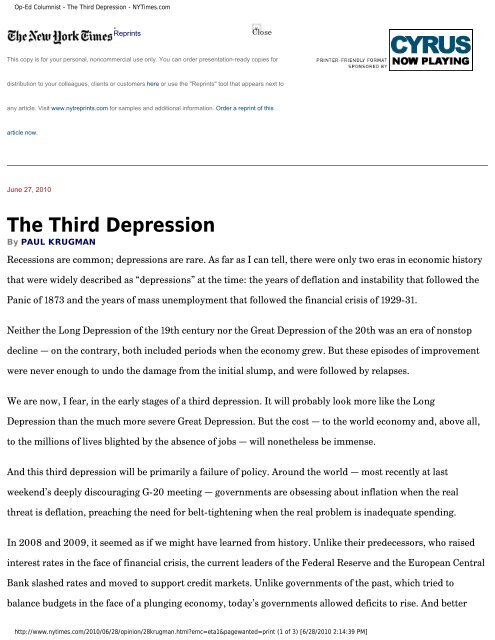Op-Ed Columnist - The Third Depression - NYTimes.com
Op-Ed Columnist - The Third Depression - NYTimes.com
Op-Ed Columnist - The Third Depression - NYTimes.com
You also want an ePaper? Increase the reach of your titles
YUMPU automatically turns print PDFs into web optimized ePapers that Google loves.
<strong>Op</strong>-<strong>Ed</strong> <strong>Columnist</strong> - <strong>The</strong> <strong>Third</strong> <strong>Depression</strong> - <strong>NYTimes</strong>.<strong>com</strong><br />
●<br />
Reprints<br />
Close<br />
This copy is for your personal, non<strong>com</strong>mercial use only. You can order presentation-ready copies for<br />
distribution to your colleagues, clients or customers here or use the "Reprints" tool that appears next to<br />
any article. Visit www.nytreprints.<strong>com</strong> for samples and additional information. Order a reprint of this<br />
article now.<br />
June 27, 2010<br />
<strong>The</strong> <strong>Third</strong> <strong>Depression</strong><br />
By PAUL KRUGMAN<br />
Recessions are <strong>com</strong>mon; depressions are rare. As far as I can tell, there were only two eras in economic history<br />
that were widely described as “depressions” at the time: the years of deflation and instability that followed the<br />
Panic of 1873 and the years of mass unemployment that followed the financial crisis of 1929-31.<br />
Neither the Long <strong>Depression</strong> of the 19th century nor the Great <strong>Depression</strong> of the 20th was an era of nonstop<br />
decline — on the contrary, both included periods when the economy grew. But these episodes of improvement<br />
were never enough to undo the damage from the initial slump, and were followed by relapses.<br />
We are now, I fear, in the early stages of a third depression. It will probably look more like the Long<br />
<strong>Depression</strong> than the much more severe Great <strong>Depression</strong>. But the cost — to the world economy and, above all,<br />
to the millions of lives blighted by the absence of jobs — will nonetheless be immense.<br />
And this third depression will be primarily a failure of policy. Around the world — most recently at last<br />
weekend’s deeply discouraging G-20 meeting — governments are obsessing about inflation when the real<br />
threat is deflation, preaching the need for belt-tightening when the real problem is inadequate spending.<br />
In 2008 and 2009, it seemed as if we might have learned from history. Unlike their predecessors, who raised<br />
interest rates in the face of financial crisis, the current leaders of the Federal Reserve and the European Central<br />
Bank slashed rates and moved to support credit markets. Unlike governments of the past, which tried to<br />
balance budgets in the face of a plunging economy, today’s governments allowed deficits to rise. And better<br />
http://www.nytimes.<strong>com</strong>/2010/06/28/opinion/28krugman.html?emc=eta1&pagewanted=print (1 of 3) [6/28/2010 2:14:39 PM]
<strong>Op</strong>-<strong>Ed</strong> <strong>Columnist</strong> - <strong>The</strong> <strong>Third</strong> <strong>Depression</strong> - <strong>NYTimes</strong>.<strong>com</strong><br />
policies helped the world avoid <strong>com</strong>plete collapse: the recession brought on by the financial crisis arguably<br />
ended last summer.<br />
But future historians will tell us that this wasn’t the end of the third depression, just as the business upturn<br />
that began in 1933 wasn’t the end of the Great <strong>Depression</strong>. After all, unemployment — especially long-term<br />
unemployment — remains at levels that would have been considered catastrophic not long ago, and shows no<br />
sign of <strong>com</strong>ing down rapidly. And both the United States and Europe are well on their way toward Japan-style<br />
deflationary traps.<br />
In the face of this grim picture, you might have expected policy makers to realize that they haven’t yet done<br />
enough to promote recovery. But no: over the last few months there has been a stunning resurgence of hardmoney<br />
and balanced-budget orthodoxy.<br />
As far as rhetoric is concerned, the revival of the old-time religion is most evident in Europe, where officials<br />
seem to be getting their talking points from the collected speeches of Herbert Hoover, up to and including the<br />
claim that raising taxes and cutting spending will actually expand the economy, by improving business<br />
confidence. As a practical matter, however, America isn’t doing much better. <strong>The</strong> Fed seems aware of the<br />
deflationary risks — but what it proposes to do about these risks is, well, nothing. <strong>The</strong> Obama administration<br />
understands the dangers of premature fiscal austerity — but because Republicans and conservative Democrats<br />
in Congress won’t authorize additional aid to state governments, that austerity is <strong>com</strong>ing anyway, in the form<br />
of budget cuts at the state and local levels.<br />
Why the wrong turn in policy? <strong>The</strong> hard-liners often invoke the troubles facing Greece and other nations<br />
around the edges of Europe to justify their actions. And it’s true that bond investors have turned on<br />
governments with intractable deficits. But there is no evidence that short-run fiscal austerity in the face of a<br />
depressed economy reassures investors. On the contrary: Greece has agreed to harsh austerity, only to find its<br />
risk spreads growing ever wider; Ireland has imposed savage cuts in public spending, only to be treated by the<br />
markets as a worse risk than Spain, which has been far more reluctant to take the hard-liners’ medicine.<br />
It’s almost as if the financial markets understand what policy makers seemingly don’t: that while long-term<br />
fiscal responsibility is important, slashing spending in the midst of a depression, which deepens that<br />
depression and paves the way for deflation, is actually self-defeating.<br />
http://www.nytimes.<strong>com</strong>/2010/06/28/opinion/28krugman.html?emc=eta1&pagewanted=print (2 of 3) [6/28/2010 2:14:39 PM]
<strong>Op</strong>-<strong>Ed</strong> <strong>Columnist</strong> - <strong>The</strong> <strong>Third</strong> <strong>Depression</strong> - <strong>NYTimes</strong>.<strong>com</strong><br />
So I don’t think this is really about Greece, or indeed about any realistic appreciation of the tradeoffs between<br />
deficits and jobs. It is, instead, the victory of an orthodoxy that has little to do with rational analysis, whose<br />
main tenet is that imposing suffering on other people is how you show leadership in tough times.<br />
And who will pay the price for this triumph of orthodoxy? <strong>The</strong> answer is, tens of millions of unemployed<br />
workers, many of whom will go jobless for years, and some of whom will never work again.<br />
More in <strong>Op</strong>inion (10 of 25 articles)<br />
<strong>Op</strong>-<strong>Ed</strong> <strong>Columnist</strong>: One Way Out<br />
Read More »<br />
http://www.nytimes.<strong>com</strong>/2010/06/28/opinion/28krugman.html?emc=eta1&pagewanted=print (3 of 3) [6/28/2010 2:14:39 PM]




